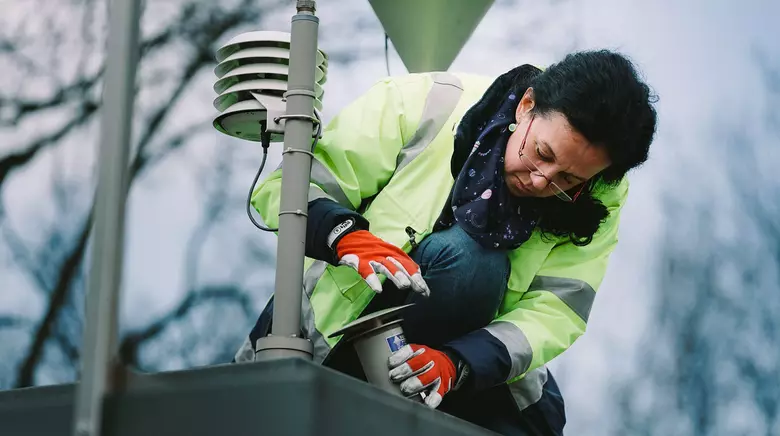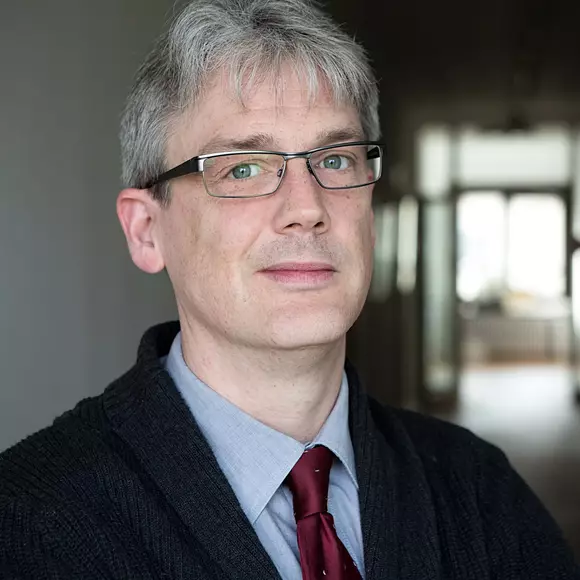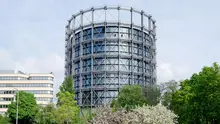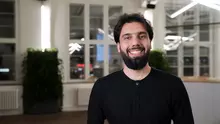Professional Fields in Environmental and Climate Protection: Career Opportunities in Berlin—A Guest Article by Krischan Ostenrath

Note: This guest article reflects only the personal opinion of the author and not necessarily the opinion of the editorial team.
Sometimes you only notice a trend when you turn it on its head. While we are currently talking about the crises gripping traditional sectors of the economy and looking for ways to save them, we occasionally forget that we are dealing with a sweeping revolution and not a one-off predicament. Services and industries that refuse to accept the need to adopt fundamentally green policies are currently facing—and will continue to face—even greater difficulties going forward. And the sectors of the economy that are committed to protecting the environment and climate have been among the winners for years.
What was ridiculed twenty years ago as a playground for advocates of alternative lifestyles and absurdly is still asked to explain how its positions are not overambitious, unrealistic, or politically motivated, is now an unprecedented success story if we take an objective look at the numbers. The Federal Environment Agency estimates that well over three million people are employed in this sector. Which, by the way, should be viewed as the lowest number actually working in the “green” economy. Most forecasts also predict that many more people might be earning their wages and salaries by protecting the environment and climate if the skilled labor needed for the task were actually available. And even if we ought to be cautious about resorting to a “shortage of skilled workers” as a hackneyed description— the demand for workers at all skill levels who can put their hands and minds to work to protect the environment and climate is quite simply huge in Berlin and elsewhere in Germany.
It is worth noting that the effects of a greener labor market from a quantitative perspective are still lagging behind the qualitative impacts. All the same, changing current professional activities remains far more important than creating new jobs in environmental and climate protection. What researchers refer to as the “greening of jobs” will mean a sweeping transformation of existing professions into sustainable job profiles. While plumbers used to install oil and gas heating systems in basements, they are now highly impactful climate specialists who fit heating systems based on renewable energies. And even those who were still happily sticking asbestos above the ceilings of Berlin a few decades ago are now open to the idea of green roofs.
In other words: The “greening of jobs” also arrived in Berlin a long time ago and is now creating fresh employment opportunities, quite aside from changing current professions.
Jobs Across All Sectors in Berlin
The most vital point for job seekers in this greening of the labor market is that sustainable business is not restricted to any one sector or profession alone. As a rule, there is no such thing as a green profession or industry. Instead, all activities and products either harm or benefit the climate to greater or lesser degrees. No sector inside or outside Berlin needs to be inherently harmful to the environment. Accordingly, the energy supply sector—as just one example—is awash with relics from the fossil fuel industry living right next door to the pioneers of a sustainable energy supply.
The same applies to the financial sector, where, in addition to conventional service providers climate and environmentally aware fintec companies have increasingly emerged alongside conventional service providers. This can apply across virtually all sectors of the economy.
And it changes the question of “Which industry is geared in particular towards the future?” to “Which players in an industry are geared in particular towards the future?”.
The nationwide Green Working World Network has listed 16 professional fieldsthat are particularly committed to protecting the environment and climate and then added a large amount of additional information and advice on training and employment opportunities. Sectors range from ecological agriculture and forestry to technical areas such as renewable energies, recycling, and water management through to financial and administrative services. This resource makes it easier for job seekers especially to navigate a continuously changing labor market, especially as the Who’s Who of the green world of work also includes some employers from Berlin.
Skilled Workers Are in Demand Across All Professions
This is also the reason why “green professions” in its literal sense simply cannot exist. If environmentally and climate-friendly work— also known as “green skills,” are present in almost all sectors, then, simply from a logical viewpoint, there must be more than a dozen professions in which people contribute to meeting the challenges of the 21st century.
If, on the one hand, it is true that one and the same vocational training or university degree can be beneficial in an environment that is either good or bad for the environment, then the reverse must be equally true as well: The profession that a person has learned is not as important as where and how their professional skills can be applied.
This is not so much due to the fact that green employers tend to be more open to applications in general, but quite simply because the core business of even the most environmentally friendly company in Berlin ultimately relies on the professional performance of specific operational tasks. It follows, therefore, that the demand for bank clerks with conventional training will naturally dominate in a sustainable bank, and sustainable craft businesses will also need well-trained craftspeople. The same applies to communication experts in a communication agency specializing in sustainability.
The green labor market does not differ significantly from traditional labor markets—what matters most is that they are looking for skilled workers who know their trade. Put differently: Practical knowledge is in demand across all professional fields.
This is good news for anyone wishing to carve their own niche, as the green economy is a great place for entrants of all ages looking for varied opportunities. But this may be bad news for those who believe that the Berlin sustainability scene is reserved for those who share the same ideology. It has to be said quite clearly here: Ideology is no substitute for competence, or, even more clearly: Specialists, not preachers of sustainability, are being sought.
Opportunities for Skilled Workers from All Over the World
Speaking of good and bad news: The Berlin sustainability scene is traditionally more open to people whose family tree does not come exclusively from old German stock. This is due firstly to the fact that Berlin’s labor market is already far more international than other regions in Germany. Secondly, environmental companies and businesses in the technology segment have a particular focus on exports.
A significant proportion of business in the German and Berlin environmental technology sector extends beyond the borders of Germany, which means that there are a large number of companies in which German is less important than foreign language skills. Even someone with the most remarkable Berlin dialect would have difficulty selling German environmental products or services to countries in neighboring Europe or the Far East. Accordingly, Berlin’s corporate landscape is also more open to foreign languages.
But the same does not necessarily apply to the issue of obtaining recognition for apprenticeships or degree programs completed abroad. Viewed traditionally, this has always been a complicated matter in Germany’s highly regulated education system, especially when—as in the public sector, for example—a specific educational qualification is a formal entry requirement.
The stomping ground of independent contractors is somewhat more open, but here, too, people will usually still need certified proof that their professional skills are recognized. Here’s a tip for skilled workers without organic German roots or educational background: Just take a look at the websites of IHK, HWK, and AHK or go to the websites of international employers’ associations and search specifically for employers whose business extends beyond the borders of Germany. This is where the chances of embarking on a career are highest, even without C2 level German, and perhaps even without a complex degree recognition procedure.
Entering the Green Job Market
Naturally, skilled workers from both Germany and elsewhere can still follow the “regular” path prescribed by the German education system to gain entry into the labor market. Often this will involve the time-consuming process of obtaining recognition for foreigneducational qualifications or navigating the almost impenetrable continuing education scene in Berlin. Both the Berlin authorities and the economic umbrella organizations provide a wide range of assistance here, starting with the Berlin integration guides and the chambers of industry and crafts mentioned above, as well as qualification programs offered by Berlin’s large and small universities.
Things get a little trickier when it comes to meaningful further training in the area of environmental and climate protection. Although the Berlin Senate Administration is generally willing to help, it too has long since lost track of the almost inexhaustible landscape of continuing education courses. The recently installed national continuing education portal mein NOW, which can of course also be filtered according to topics and regions to search specifically for further training in the environmental and climate sector.
In individual cases, people may be well advised to call and inquire with the relevant professional associations, which are usually familiar with the local training scene much better than anyone else.
OUR TIP
Are you interested in finding a job in climate and environmental protection? If so, then read our article on Sustainable Work vs. Working for Sustainability: Here Are the Differences.
Searching for a Job in Berlin’s Green Economy
The question remains as to how you can actually get a job. This requires a distinction between a conventional application in response to a job advertisement and tapping into what might be called the “hidden” labor market. In the first case mentioned above, a number of very profitable online job boards specializing in the sustainability sector such as greenjobs or GoodJobs have been established. Naturally, interested parties can search their databases for individual sectors and specifically for the Berlin region.
Other online job platforms are listed in the Who’s Who of the Green Working World Network, in this case under the category Media and Trade Fairs. But since it is reasonable to assume that you will not be the only applicant for a recently advertised vacancy and the hidden job market is much larger anyway, it usually makes more sense—especially for career entrants in the green sector—to send unsolicited applications to potential employers.
When looking for employers in the sustainability sector, it is helpful of course to consult the Who’s Who of the Green Working World Network, but also to take a look at the membership lists of the two major sustainability associations: BAUM e. V. or the Bundesverband Nachhaltige Wirtschaft. These associations are at the political and professional vanguard of the sustainability scene, and it can be confidently assumed that any employers joining their ranks will have greater sensitivity towards environmental and climate-related issues.
A small tip on the side: You can also offer to work as a freelancer if you want to alleviate an employer’s concerns about offering a permanent position. Of course, this option is only for the brave with the necessary boldness to go freelance. But you wouldn’t be the first to end up in a permanent position with the client after a period as a freelancer.
The following applies in any case, and of course to environmental and climate protection work as well: You can only find something good if you know what you are looking for. If you have the idea of doing “something with the climate”, you will get about as far in Berlin as those people looking for “something with people.” So, not far at all.
The first step into the green labor markets is therefore to find out what you can do and what you actually want. However trivial this may sound, it is anything but in Berlin’s labor market of almost 1.7 million full-time, tax-paying employees.
Therefore, you should use all the digital and analog options at your disposal to familiarize yourself with your target job market —whether in the professional fields listed on the Green Working World Network, digital and analog offers from employers, or specific orientation programs organized by public institutions and specialized professional associations.
No one will navigate the market for you, and no one will knock on your door and invite you to an interview. Berlin’s green economy is waiting for you, but you still have to take the first step.









